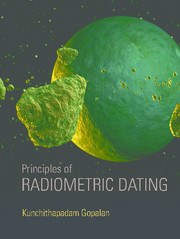Book contents
- Frontmatter
- Dedication
- Contents
- Preface
- Acknowledgments
- 1 Basics
- 2 Nuclear Transformations
- 3 Nucleosynthesis
- 4 Isotopics
- 5 Radioactivity and Radiometric Dating
- 6 Mass Spectrometry and Isotope Geochemistry
- 7 Error Analysis
- 8 Meteorites: Link between Cosmo- and Geochemistry
- 9 Chronology of Meteorite History
- 10 Chemical Evolution of the Earth
- 11 Chronology of Earth History
- References
- Index
11 - Chronology of Earth History
Published online by Cambridge University Press: 21 October 2017
- Frontmatter
- Dedication
- Contents
- Preface
- Acknowledgments
- 1 Basics
- 2 Nuclear Transformations
- 3 Nucleosynthesis
- 4 Isotopics
- 5 Radioactivity and Radiometric Dating
- 6 Mass Spectrometry and Isotope Geochemistry
- 7 Error Analysis
- 8 Meteorites: Link between Cosmo- and Geochemistry
- 9 Chronology of Meteorite History
- 10 Chemical Evolution of the Earth
- 11 Chronology of Earth History
- References
- Index
Summary
Geology is the study of complex natural experiments conducted on a large scale in both time and space. The experiments are neither reversible nor repeatable. They cannot be directly observed; but they must be reconstructed historically.
S A SchummWe view samples of the accessible universe as a library of experiments that have already been done (at different times and sites). Our art must be to select those materials which have a persistent memory and which together can bring testimony to the natural experiment of interest.
G J WasserburgINTRODUCTION
Simply stated, the present Earth is very different from the early Earth. The main objective of geology is to reconstruct the time sequence and nature of the key or major processes that shaped the Earth over 4.5 Gy. Schumm (1991) cautions that this task will be quite formidable by quoting a metaphorical statement of Pretorius in a different context, as follows:
It is the nature of the history of the earth that a geologist has available to him only partial information. Occasional lines from disconnected paragraphs in obscuranist chapters are what can be read. Violence in the handling of the book through time has caused many of these chapters to be ripped and reassembled out of context. That the gist of early chapters can be deciphered at all is a credit to the perseverance and imagination not always associated with other sciences. The geologist operates at all times in an environment characterized by a high degree of uncertainty and ornamented with end products which are the outcomes of the interactions of many complex variables. He sees only the end, and has to induce the processes and responses that filled the time since the beginning.
To extend this metaphor further, some of the missing pages of the book of genesis of the Earth may have to be found in the libraries of experiments carried out on other planets.
In this chapter we will consider how radiogenic isotope geochemistry has provided firm constraints on the timing of some major or large scale events in Earth's history.
- Type
- Chapter
- Information
- Principles of Radiometric Dating , pp. 161 - 191Publisher: Cambridge University PressPrint publication year: 2017



